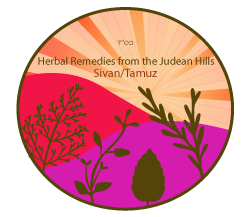Printable Version
A Natural Antibiotic, Stamina Strengthener, Indigestion Causing Plant
Garlic doesn’t grow in my garden, but it does decorate my kitchen and is easily available in the local grocery stores. Every Thursday afternoon when I cook up a storm, I open about 15 cloves of garlic, which I use generously in salads, dips, soups and casseroles. If any dish seems a bit bland, adding some garlic will usually take care of it. However, when my mother is visiting, I have to go gently with the garlic, as she doesn’t digest it well. She is not the only person I know with allium intolerance. On the other hand, garlic has been used for medicinal purposes for thousands of years. Everyone knows that garlic is the best natural antibiotic to prevent or curtail the flu and common cold.Allicin-containing garlic supplement can prevent attack by the common cold virus. This is substantiated by numerous scientific studies, i.e. P. Josling, Preventing the common cold with a garlic supplement: a double-blind, placebo-controlled survey. Supplementation with aged garlic extract reduces the severity of cold and flu symptoms: A randomized, double-blind, placebo-controlled nutrition intervention. The Jewish penchant for garlic stems all the way back to the time of our bondage in ancient Egypt, as we learn in this week’s Torah portion:
ספר במדבר פרק יא פסוק ה זָכַרְנוּ אֶת הַדָּגָה אֲשֶׁר נֹאכַל בְּמִצְרַיִם חִנָּם אֵת הַקִּשֻּׁאִים וְאֵת הָאֲבַטִּחִים וְאֶת הֶחָצִיר וְאֶת הַבְּצָלִים וְאֶת הַשּׁוּמִים:
“We remember the fish that we ate in Egypt free of charge, the cucumbers, the watermelons, the leeks, the onions, and the garlic” (Bamidbar 11:5).
Garlic was part of the daily diet of many Egyptians. Particularly the Egyptian working class and the Jewish slaves in Egypt were fed garlic and other allium vegetables, to maintain and increase their strength, in order to enable them to work harder and increase their productivity.
Why Should You Serve your Husband Garlic Friday Night?
There are additional, juicier explanations for why garlic is so central in the Jewish cuisine. I recall how the Yeshiva’s wise women initiated me into the secret of garlic, when I first became religious in 1980 and soon after married. “You must serve stir-fried garlic for Friday night dinner,” they insisted, “in order to ensure marital bliss.” This is because Friday night is traditionally the special designated time for marital intimacy, and according to the Talmud, garlic increases male sexual performance and fertility. In fact, eating garlic Friday night is one of the five regulations enacted by Ezra when he led the return of the Jewish people from Babylonia to Israel:
 |
| Garlic hanging on Rebbetzin’s kitchen wall |
תלמוד בבלי בבא קמא דף פב/א עשרה תקנות תיקן עזרא…אוכלין שום בערב שבת משום עונה דכתיב אשר פריו יתן בעתו וא”ר יהודה זה המשמש מטתו מערב שבת לערב שבת. ת”ר חמשה דברים נאמרו בשום משביע ומשחין ומצהיל פנים ומרבה הזרע והורג כנים שבבני מעיים וי”א מכניס אהבה ומוציא את הקנאה:
Ezra made ten regulations…That they eat garlic on the eve of Shabbat, on account of the mitzvah to have sexual relations. As it is written, “He shall be like a tree that yields its fruit in its proper time” (Tehillim 1:3). Rav Yehuda taught, this verse refers to a person who has sexual intercourse from Friday night to Friday night. The rabbis taught that garlic has five qualities: It satiates and warms the body and brightens the face, it increases semen, and it kills parasites in the intestines. Others add that it instills love and so eliminates jealousy (Babylonian Talmud, Bava Kamma 82a).
Garlic – Good or Bad for Your Health?
Garlic has traditionally been used to kill parasites and controlsecondary fungal infections. Current scientific studies verify the Talmudic dictum that garlic kills parasites in the intestines. Garlic detoxifies while gently stimulating elimination. It has antioxidant properties that protect against oxidation caused by parasite toxins. In spite of the many additional proven health benefits of garlic that we list below, Rambam classifies garlic as one of the damaging foods that should be eaten cautiously. “There are other kinds of food that are injurious… A little of them at a time may therefore be taken, but only at intervals of several days. One should not accustom oneself to make a meal of them or to eat them regularly with the meal. Examples of this category are… leeks, onions, garlic; mustard and radish. All these are bad foods. They should be eaten very sparingly and only during winter. In the summer, they should not be eaten at all. Neither in summer nor in winter should beans or lentils be eaten as a separate dish. Gourds may be eaten in summer (Rambam, Hilchot Deot 4:9). When I teach Rambam on Nutrition & Health, I emphasize that Although Rambam lived almost a millennium ago, his general principles are still 100% relevant for today. Yet, when it comes to particular foods, it is questionable whether Rambam’s guidelines apply today. The reason for this could be that the nature of vegetables has changed substantially in the last 1000 years, due to changes in climate, soil condition, water quality and more. I imagine that in Rambam’s time, garlic was much stronger than it is today and was therefore suitable only as a medicine rather than a food. It is also possible that our constitutions have changed since Rambam’s time and that we have become more tolerant to some of the foods which he classifies as being damaging. Since medieval times, garlic has been known as a food that a breastfeeding mother must limit in her diet, to avoid aggravating her colicky baby. Although, recent studies indicate that garlic may actually increase mother’s milk, it is listed among the ‘gassy veggies’ together with onion, and cucumbers. This correlates with the vegetables mentioned in the Torah verse quoted above. Rashi explains why the Children of Israel complained about missing these vegetables. In their daily manna diet, the manna could, have the taste of any food they imagined except for these particular vegetables. “Why did the manna change into everything except these? Because they are harmful for nursing mothers. We tell a [nursing] woman, ‘Do not eat any garlic or onion, for the baby’s sake…’” (Rashi, Bamidbar11:5).
Health Benefits and Concerns of Garlic
On the other hand, garlic contains allicin, which has potent medicinal properties. It is also very rich in Vitamin C, Vitamin B6 and Manganese. Moreover, garlic contains trace amounts of various other nutrients. In addition to the health benefits already mentioned, I noted the following health benefits of garlic:
In conclusion, it seems that most people can benefit greatly from garlic consumption within bounds, making sure to avoid going overboard.
Leaving Pealed Eggs, Onions or Garlic Overnight
Our Sages warn us to avoid eating peeled eggs, onions, or garlic that have been left overnight as this could cause danger, forgetfulness, and poverty. A negative energy called ruach ra may dwell on the peeled eggs, onions, and garlic, even if they are covered by a cloth or placed in a bag. However, if we leave a little of the peel then we’re on the safe side. (Likutei Halachot of Chafetz Chaim Niddah 17a; Ein Mishpat ot 7; Shulchan Aruch Harav, Hilchot Shmirat Haguf v’Hanefesh Seif 7 and many other halachic sources). Most people are not concerned when these foods are mixed with other food, like in a salad (Samak, Ben Ish Chai; Kaf Hachaim). Some Rabbis say that pickling these foods in vinegar or saltwater or cooking them makes them no longer harmful when left overnight. (Kaf HaChaim Yoreh Deah Siman 115 Ot 93, Tosfot Chayim). According to this view you may buy minced garlic in a jar, since the garlic is mixed with vinegar. Likewise, if you want to save time and peel garlic in advance, make sure to mix the garlic with salt or vinegar before freezing or refrigerating.
Ancient Garlic Power
Allium Sativum, commonly known as garlic, has been considered a sacred and powerful herb since ancient times, both for its spiritual and its healing properties. Garlic has been used by every civilization throughout history, from biblical times until today, including the ancient Greeks and Romans, as well as Asian and European cultures. It was fed to the pyramid builders in ancient Egypt to increase their strength and stamina, while soldiers consumed it to help boost their courage in battle. Ancient Greece administered garlic to athletes before they competed in the first Olympic games, and the Romanians used garlic to repel vampires. They also placed garlic around the house and rubbed it on their doors, windows and gates for spiritual protection. Even today, garlic can help dispel negativity, and prevent envy and jealousy, as mentioned in the Talmud.
Hands On
Garlic enhances the flavor of so many dishes while boosting their health benefits. In Mediterranean cooking, garlic is used in almost every recipe except for desserts. The more you damage garlic’s cell walls, the more its active ingredient, Allicin, is released, giving a more pungent garlic flavor. Since crushing breaks the most cells, crushed garlic cloves taste harsher than sliced or coarsely chopped garlic cloves. Intact garlic cloves are mildest of all. Mashing minced garlic with a pinch of coarse salt helps tame the harsh flavor. Nibble parsley to get rid of garlic breath. To remove garlic smell from your hands, rub them with a lemon wedge, salt or baking soda. Rinse hands well with water.
Roasted Garlic and Butternut Squash Chumus with Goat’s Cheese
The base of this chumus is made of butternut squash, which creates a sweet, light dip that is complemented by aromatic roasted garlic bulbs.
A small/medium butternut squash (700-900g)
4 tablespoons olive oil, plus extra to rub on the squash and garlic and to serve
2 garlic bulbs – about 25-30 cloves
Lemon zest from ½ lemon and a generous squeeze of juice
2 tablespoons techina
10 sprigs of fresh thyme, leaves torn from stems
A handful of flat-leaf parsley, finely chopped
50g creamy goat’s cheese
Salt and black pepper to taste
1. Preheat oven to 200C (400F). Cut the butternut squash in half and remove the seeds. Rub it with olive oil and a pinch of salt and pepper. Bake in the oven for 45-60 minutes, depending on size.
2. Split the garlic into individual cloves but keep the peel on. Rub them with a little olive oil and bake for around 20-25 minutes beside the squash. Keep an eye on the garlic cloves – they should be tender and golden, not hard and burnt.
3. When everything is done, scoop out the flesh of the butternut squash and peel the garlic cloves. Place both in a blender and add the lemon zest, juice and tahini. Pulse until the garlic and squash are well combined. Transfer to a bowl.
4. Add half the chopped parsley and season to taste with salt and pepper.
5. Serve with crumbled goat’s cheese, a splash of olive oil and the rest of the fresh herbs scattered on top.
 Herbal Remedies from the Judean Hills
Herbal Remedies from the Judean Hills

Soooo interesting!!! thank you!
you mention garlic allergy. as a good Jewish wife, I used to spice my Friday night salads and fish generously with garlic. in recent months i found myself waking up with tummy aches after such a meal. it slowly occurred to me that garlic could be the culprit especially since i did not suffer after eating at my daughter's, who does not use garlic in her salads. I never thought that anyone could be allergic to such a healthy food but there – you mention it too! it could be that many years of exposure to allicin can sensitize the intestines & lead to such an allergy.
Its called a intolerance or sensitivity rather than allergy.
The difference between a food allergy and sensitivity is the body's response. When you have a food allergy, your immune system causes the reaction. If you have a food sensitivity or intolerance, the reaction is triggered by the digestive system.Nov 20, 2015